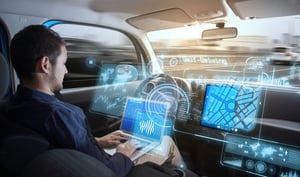In this special blog series, we will review the disruptive technologies being introducing by today’s forward-thinking manufacturers. Over the next few weeks, you’ll learn about the cutting-edge tools transforming the industry and the ways ERP can support their implementation.
Imagine a future where you don’t need to own a car. You can simply hail a ride – in a self-driving car, also known as an autonomous vehicle (AV) – outside your doorstep. Your pocketbook – and the economy at large – would look a lot different. Our roads and our environment would be transformed.
This future is not that far off, according to a recent report by ReThinkX that predicts that 60% of the country’s vehicles will be self-driving by the year 2030. But to get there, automakers and associated suppliers must equip themselves with the tools necessary to serve a market that has never before existed. Real-time data will be critical to keep up with – and anticipate – the needs of a new breed of vehicle and a new breed of customer.
Here are three critical ways an ERP system can support AV manufacturers in the years ahead.
1. Operational Agility
As if automakers don’t already have enough parts and systems to track, AVs bring with them a new wave of required hardware. Radars, cameras, lidar,  chips. Each presents unique challenges, but having a reliable ERP system in place can help keep production efficient and cost-effective when new variables enter the mix.
chips. Each presents unique challenges, but having a reliable ERP system in place can help keep production efficient and cost-effective when new variables enter the mix.
For example, when launching new products, an ERP system can be vital in tracking product successes and failures and analyzing test performance. Historical data can also help manufacturers avoid past mistakes and choose appropriate suppliers based on previous projects. And when it comes time for product launch, advanced analytics and projection capabilities can help ensure your scale of production and pricing are spot-on.
2. Predictive Maintenance
Sensors are a critical piece of what helps a driverless car know when and where to operate, but sensors are also used in mechanical and electronic systems to monitor systems and parts performance. Data from these sensors, as well as from warranty repairs, can be filtered into the reporting systems of fleet managers, service providers and manufacturers. By aggregating the data of thousands of vehicles, patterns can be recognized, and issues can be detected. Using advanced analytics, these data could also be leveraged to make long-range projections about maintenance and trends for parts or systems exhibiting failure so automakers can reinforce the quality of future products.
3. New Business Models
Driverless cars will disrupt the industry in ways that can’t be foreseen. ERP systems will help savvy manufacturers to recognize opportunities to pivot their business model or take on a new role that will be valuable to AV customers.
One area experts are pondering is auto insurance. Today’s car insurance companies have no data when it comes to driverless cars. How do they perform? What’s their track record? On the flip side, as previously discussed, AV manufacturers will have real-time feedback about accidents and near-misses – important data points in determining the cost of car insurance. Could AV manufacturers become the car insurers of the future? How else might automakers serve this brave new industry? It might not be long before we find out.
Curious about other tech trends in Manufacturing?
Download our e-book, “Disruptive Manufacturing: 3 Technologies That Will Transform You Operations,” to learn about leading-edge technologies and features emerging in the world of ERP.
Choosing an ERP Consultant
One-size-fits-all is not an option when it comes to ERP systems. The Copley Consulting Group knows there are several factors to determine the right fit for your organization. When working to implement your ERP solution, Copley can provide the technology and support needed for your specific industry and business when choosing between cloud-based or an on-premise ERP. To discuss the right ERP system for your organization, complete our contact form, call us at 855-884-5305, or email us at info@copleycg.com.

